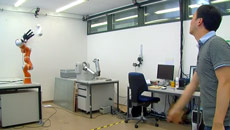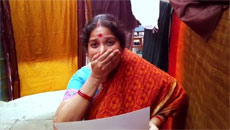A new Canadian technology could be the key to ensuring an astronaut's health and well-being as they embark on deep space missions.
Researchers at St. Mary's Hospital in Montreal are part of a team that is developing a cutting-edge medical tool designed to provide remote care to astronauts who are likely to be cut off from home as space exploration evolves.
The tool could also have usefulness beyond far-flung outer space missions: researchers think it could make first-world health care available worldwide.
"You're now getting (with the tool), at the very least, the assurance that a patient is being seen and their condition is being assessed based on all the knowledge available," said Michel Lortie, systems engineer at St. Mary's Research Centre and part of the development team.
It sounds like something out of science fiction — a virtual medical consultant combining the knowledge of a psychologist, occupational therapist, family doctor and emergency-room physician all in one.
The tool is dubbed the advance crew medical system (ACMS) and is comprised of small body sensors that are attached to an astronaut to monitor their health. Using information gathered in real time and comparing it to previous medical history, the tool can provide treatment instructions and advice to the crew medical officer.
The technology is important as exploration moves beyond the International Space Station to long-haul space missions. For example, a trip to Mars or an asteroid far from Earth presents a different set of challenges: isolation, weightlessness, psychological stress and radiation among the possible obstacles.
Lortie says the tool can be constantly updated with current information whether it is on a Mars-bound shuttle or in a rural village on Earth. In the latter case, the tool could prove useful if there are no medical professionals in the vicinity.
Lortie said a qualified operator is required to operate the tool — but not necessarily a doctor. Someone with basic medical knowledge akin to that of a first responder could operate it.
"The system is not an automaton, it doesn't have eyes, it doesn't have hands, it's not going to reach out and touch you, at least not yet," Lortie says. "It's going to work through a human, so we're not suggesting the human is removed from a very human activity — that of encountering your physician and discussing your illness."
For someone like Dr. John Hughes, professor of family medicine at McGill University and part of the research team, having the information in one place allows the doctor to put his focus on the patient.
"It will allow me to have at my fingertips, instantaneously, the best available knowledge for the problem I have in front of me," Hughes said.
The McGill-affiliated hospital's contribution is an algorithm that is described as the brain behind the virtual medical consultant. It is being developed by partners that include McGill University health and engineering departments and engineering firm Neptec with funding from the Canadian Space Agency.
Development on the concept stage began in January 2013. Since it isn't in beta format, no further testing has been done as yet, Lortie said. More funding will be needed to go forward, but the biggest obstacle might be gathering medical knowledge and putting it in an accessible format.
"The system is really a large collection of knowledge and the piece of software to process that knowledge," Lortie said. "The software is in at least a workable form ... but the large amount of data, the knowledge, is the part that is not as well developed."





